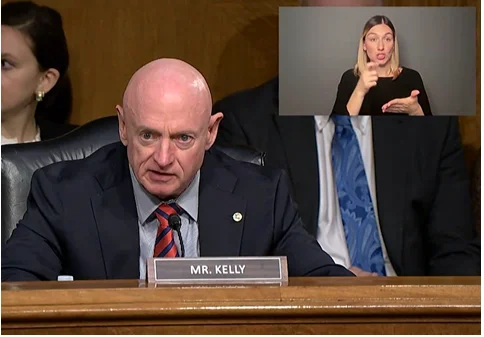WATCH: Kelly Highlights Safety Concerns at Arizona Assisted Living Facilities During Senate Hearing
Today, during a Senate Aging Committee hearing, Arizona Senator Mark Kelly raised the issue of safety and transparency concerns at Arizona assisted living facilities and discussed potential steps from the state and federal government to address them.
In his remarks, Kelly highlighted investigative reporting from the Arizona Republic that documented multiple incidents of physical and sexual abuse at Phoenix-area assisted living facilities. The reporting revealed how regulators failed to investigate and respond to incidents of violence among residents. Kelly raised the legislative proposal from Governor Hobbs to improve oversight and transparency in these facilities to protect Arizona’s seniors and give peace of mind to their families.
Click here to download video of Kelly’s remarks. See the transcript below:
Sen. Kelly: Thank you, Mr. Chairman, and thanks to all our witnesses for being here today.
Mr. Mollot, the Arizona Republic, the paper of record in my state, published a series of investigative reports last year about the state of long-term care facilities in Arizona. These journalists spent more than a year on this investigation.
They reviewed police reports, they reviewed footage in some facilities, they analyzed regulatory reports from the state, and they interviewed families and experts. What they found was—I think it’s fair to say—horrifying.
They reported graphic stories of a resident dying after being attacked by a roommate who hadn’t received her medication in time. Another report of an assisted living resident being sexually assaulted by another resident, and incidents of violence among residents that often aren’t reported because they aren’t required to be reported under state law.
And they highlighted the failure of state agencies to investigate these cases in a coherent, transparent way that would allow families looking for a safe place for their loved one to know what really goes on in these facilities.
I think a lot of us knew there were issues in the system. We knew that. But I don’t think we knew how bad it was.
Since these articles were published, Arizona’s governor has put together a strong legislative package to standardize inspections, promote transparency for residents and their families, and empower our adult protective services to investigate appropriately. The state legislature is looking at proposals.
So, Mr. Mollot, are these the type of steps that can help tackle these issues?
Richard Mollot (Executive Director, Long-Term Care Community Coalition): I believe so. Of course, the details matter. These are very nuanced issues about caring for people with dementia and ensuring that things are reported appropriately and that there’s good oversight. As much as possible, we would hope that a state would be looking to implement policies and practices that prevent bad things from happening as well as, of course, ensuring that, when they do happen, that they are rectified and that they are reported appropriately.
Sen. Kelly: So, Arizona can’t be the only state that’s facing these challenges?
Richard Mollot (Executive Director, Long-Term Care Community Coalition): Not at all.
Sen. Kelly: So, should the federal government maybe consider having a role here in providing oversight for assisted living facilities?
Richard Mollot (Executive Director, Long-Term Care Community Coalition): I think it’s time for the federal government to step in. As I mentioned in my testimony, 40 years ago, when nursing homes were in crisis, Congress stepped in, Congress initiated action, and we are here now with assisted living as well. The same population, in terms of numbers of people, are in assisted living as they are in nursing homes, but we don’t know what’s happening to them. We don’t know the care they’re receiving. A lot of it is private pay, not all of it, but there’s unfortunately a lot of fraud.
Sen. Kelly: So, apparently, more than 20 years ago, this committee helped to facilitate the creation of an assisted living workgroup, which was made up of 50 organizations. This work group was tasked with coming up with recommendations for best practices in assisted living facilities to ensure a more consistent quality landscape across states. The result was a 380-page report with a lot of recommendations. These were hard to agree upon.
So, Mr. Mollot, what has happened with these recommendations since this report was finished, if you are familiar with it?
Richard Mollot (Executive Director, Long-Term Care Community Coalition): I haven’t read it in a long time, but I am familiar with it. Frankly, on the federal level, nothing has happened. So, as Ms. Simpkins said, we do see some things going on in the states, but it’s, generally speaking, these states are just not inclined, frankly, to take action on a lot of the work that they do.
Hopefully they’ll be different in Arizona, but it really is time, I believe, for the federal government to step in to ensure that wherever someone accesses dementia care, that means something. It’s not just a term of art. And wherever they go for safety, they know that they can live safely. Wherever they are going into, they know what the expenses are going to be, that they’re cognizant.
Sen. Kelly: Thank you. I do want to note for my constituents, a resource created by AARP Arizona and by the Arizona Republic following this investigative series that I mentioned. It’s a backgrounder on long-term care, the definitions of different terms, what families should look for, and what questions to ask.
Folks can find this on the AARP Arizona website, and my office will be posting this on our social media accounts. I’m going to submit this for the record as well, Mr. Chairman. I urge Arizonans, or anybody else interested to check it out. Thank you.

